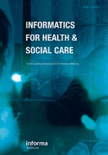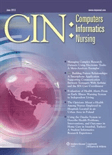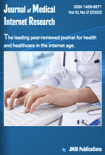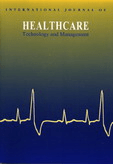
Health and Technology
Scope & Guideline
Advancing Healthcare Through Technological Insights
Introduction
Aims and Scopes
- Health Informatics and Digital Health Solutions:
Research in this area explores the application of information technology in managing health data, enhancing patient engagement, and improving healthcare delivery systems. - Artificial Intelligence and Machine Learning:
The journal includes studies on the use of AI and machine learning techniques for disease diagnosis, treatment prediction, and healthcare management, highlighting their potential to revolutionize patient care. - Radiation Therapy and Dosimetry:
A significant focus is on advancements in radiation therapy techniques, including dosimetry, treatment planning, and the evaluation of new technologies in cancer care. - Telemedicine and Remote Health Monitoring:
This scope covers the growing field of telemedicine and remote monitoring technologies, particularly in response to the COVID-19 pandemic, emphasizing their role in improving access to care. - Nanotechnology in Healthcare:
Research on the application of nanotechnology in developing new diagnostics, therapeutics, and health monitoring tools is a crucial area of exploration. - Health Equity and Access to Technology:
The journal addresses issues related to health disparities and the challenges of technology adoption in low- and middle-income countries, promoting equitable healthcare solutions.
Trending and Emerging
- Integration of AI in Clinical Practice:
There is a notable increase in publications discussing the integration of AI tools in clinical settings, emphasizing their role in diagnostics, treatment planning, and operational efficiency. - COVID-19 Related Health Technologies:
The pandemic has catalyzed research on technologies aimed at managing COVID-19, including telehealth solutions, remote monitoring, and AI applications for virus detection. - Wearable Health Technologies:
Research on wearable devices and their applications in continuous health monitoring and disease management is gaining momentum, reflecting a growing interest in personalized health solutions. - Data Privacy and Security in Health Technology:
As digital health solutions proliferate, there is an increasing focus on data privacy, security, and ethical considerations surrounding the use of health data. - Interdisciplinary Approaches to Health Technology:
Emerging themes highlight the importance of interdisciplinary research that combines insights from engineering, healthcare, and social sciences to address complex health challenges.
Declining or Waning
- Traditional Medical Imaging Techniques:
There appears to be a reduced focus on conventional methods of medical imaging, as newer technologies and AI-driven approaches gain traction, overshadowing older modalities. - Regulatory Compliance in Medical Devices:
Research on regulatory compliance issues for medical technology seems to be less frequent, possibly due to a saturation of earlier discussions and the emergence of more pressing topics. - Public Health Responses to Non-Communicable Diseases:
The journal has seen fewer articles addressing non-communicable diseases, which may be shifting in focus towards infectious diseases and health crises such as COVID-19.
Similar Journals

Telemedicine Reports
Connecting technology and healthcare for improved patient outcomes.Telemedicine Reports is a pioneering open access journal dedicated to disseminating cutting-edge research and advancements in the rapidly evolving fields of telemedicine and health informatics. Published by MARY ANN LIEBERT, INC, this journal has established itself as a valuable resource for researchers, healthcare professionals, and students, providing insights into the integration of technology in healthcare. Since its inception in 2020, Telemedicine Reports has contributed to the discourse around remote healthcare delivery, accessibility, and patient outcomes, aligning with its rankings in the Q3 quartile across Computer Science Applications, Health Informatics, and diverse areas of Medicine as of 2023. With an emphasis on empirical studies and innovative methodologies, the journal aims to advance the understanding and application of telemedicine practices in both clinical and research settings. With an impact factor reflective of its importance, Telemedicine Reports facilitates an open access model, encouraging widespread dissemination and accessibility to research findings that are crucial in reshaping patient care in a digital age.

Journal of Medical Signals & Sensors
Elevating Medical Research with Rigorous Peer ReviewJournal of Medical Signals & Sensors, published by Wolters Kluwer Medknow Publications, is a pioneering platform in the fields of Biomedical Engineering, Computer Science, and Health Informatics, focusing on innovative research and advancements in medical technology. With an Open Access policy since 2012, the journal promotes widespread dissemination of knowledge, aiming to facilitate the sharing of vital insights and developments among researchers, healthcare professionals, and students globally. The journal has achieved commendable rankings in its various categories, including Q3 in Biomedical Engineering and Radiology, underscoring its importance in advancing health technology and informatics. Its commitment to rigorous peer review ensures that published works are of the highest quality, making it a valuable resource for those engaged in cutting-edge medical research. With annual publications planned through 2024, the Journal of Medical Signals & Sensors continues to expand its influence and relevance in a rapidly evolving scientific landscape.

Informatics for Health & Social Care
Exploring the future of care through informatics.Informatics for Health & Social Care is a leading journal published by Taylor & Francis Inc, dedicated to the intersection of health informatics and social care. With a strong emphasis on advancing knowledge in the fields of health information management and nursing, this journal has established itself as a vital resource for researchers and professionals seeking to explore innovative applications of informatics to improve patient outcomes and streamline healthcare delivery. Recognized for its influential contributions, it currently holds a Q2 ranking in both Health Informatics and Health Information Management, as well as a prestigious Q1 ranking in Nursing (miscellaneous) for 2023, signifying its critical role within the academic community. The journal is accessible for open access viewing, fostering a broader dissemination of research findings. Released continuously since 1976, it stands as a testament to the evolving landscape of health informatics, addressing pertinent issues and facilitating discussions that shape practices in health and social care delivery.

CIN-COMPUTERS INFORMATICS NURSING
Catalyzing Change in Healthcare through Informatics ResearchCIN-COMPUTERS INFORMATICS NURSING is a distinguished journal that publishes cutting-edge research at the intersection of nursing and information technology. Published by Lippincott Williams & Wilkins, the journal has been a pivotal platform since 2002, catering to the needs of health informatics professionals and nursing researchers. With an impressive impact factor and ranked within Q2 in Nursing (miscellaneous) and other relevant categories, it serves as a key resource for advancing knowledge and best practices in the field. The journal's inclusion in important databases ensures broad visibility and access to the latest findings that influence healthcare delivery. CIN-COMPUTERS INFORMATICS NURSING welcomes a diverse range of articles, including empirical studies, reviews, and innovative methodology approaches, making it an invaluable asset for clinicians, educators, and scholars dedicated to enhancing nursing informatics and improving patient outcomes.

JOURNAL OF MEDICAL INTERNET RESEARCH
Exploring Innovations in Health InformaticsJOURNAL OF MEDICAL INTERNET RESEARCH, published by JMIR PUBLICATIONS, INC, stands as a pivotal resource in the field of Health Informatics, with an esteemed ranking of #7 out of 138 in the Scopus database, placing it in the top 95th percentile. Since its inception in 1999, this Open Access journal has been committed to disseminating high-quality, peer-reviewed research that explores the intersection of healthcare and internet technologies. With its headquarters in Toronto, Canada, the journal encompasses a broad range of topics, including eHealth, telemedicine, and mobile health innovations. The impact factor and its Q1 quartile ranking highlight the journal's significant influence and prevalence in advancing the understanding of digital health landscapes. Researchers, professionals, and students alike benefit from its valuable insights, making the JOURNAL OF MEDICAL INTERNET RESEARCH an essential tool for fostering informed practices and policy-making in the rapidly evolving domain of health informatics.

Intelligent Medicine
Revolutionizing healthcare outcomes with intelligent solutions.Intelligent Medicine, published by Elsevier, is a leading open-access journal dedicated to advancing the fields of Artificial Intelligence, Biomedical Engineering, Health Informatics, and related areas within Medicine. Since its inception in 2021, it has quickly established itself among the top tier of academic publications, holding a commendable Q2 ranking in several categories, including a rank of #51 in Health Informatics and #104 in Medicine (Miscellaneous) as of 2023. The journal aims to disseminate innovative research that harnesses AI technologies to improve healthcare outcomes, bridging the gap between cutting-edge technology and medical practice. With its open-access model, Intelligent Medicine ensures broad dissemination of research findings, facilitating collaboration and knowledge sharing among researchers, practitioners, and students globally. Located in Amsterdam, Netherlands, this journal plays a pivotal role in shaping the future of intelligent healthcare solutions, inviting submissions that push the boundaries of conventional medicine through creative and impactful research.

TECHNOLOGY AND HEALTH CARE
Exploring the Intersection of Care and TechnologyTECHNOLOGY AND HEALTH CARE, published by IOS PRESS, stands as a prominent interdisciplinary journal dedicated to the integration of technology within the healthcare sector. With an ISSN of 0928-7329 and an E-ISSN of 1878-7401, this journal has been a vital resource since its inception in 1993, providing insights and advancements in various categories including bioengineering, biomedical engineering, health informatics, and more. Though it currently holds a Q4 classification in several fields and Q3 in others, it actively contributes to the dialogue surrounding innovative methodologies and practices that enhance healthcare delivery. Researchers, professionals, and students will find the journal invaluable for its diverse range of studies that explore the convergence of technology and health. Its commitment to fostering impactful research continues to reinforce its relevance in the evolving landscape of healthcare technology.

International Journal of Healthcare Technology and Management
Empowering Healthcare Solutions with Cutting-Edge ResearchThe International Journal of Healthcare Technology and Management is a premier scholarly publication that delves into the intersection of technology and management within the healthcare sector. Published by InderScience Enterprises Ltd since 1999, this journal offers a platform for researchers, healthcare professionals, and students to share and discuss innovative solutions and management practices that enhance healthcare delivery. Despite its current standings in the Q4 category for Health Informatics and Leadership and Management, the journal remains a vital resource for emerging trends and interdisciplinary actions that can influence the future of healthcare technology. With an emphasis on empirical research and practical applications, the journal aims to foster collaboration and knowledge dissemination among the healthcare community. Although not currently open access, it remains accessible to academic institutions and professionals worldwide. Since its inception, the journal has consistently aimed to provide high-quality content that addresses significant challenges in healthcare technology, making it an essential asset to any academic or professional library.

International Journal of Technology
Connecting Ideas, Inspiring Solutions in TechnologyInternational Journal of Technology is a pioneering open-access journal published by UNIV INDONESIA, FAC ENGINEERING, showcasing innovative research and technological advancements across various disciplines. Established in 2010, this journal has rapidly gained recognition, achieving impressive rankings in the Scopus database, including Q2 in Engineering (miscellaneous) and Q1 in Multidisciplinary categories for 2023. It serves as a vital platform for interdisciplinary collaboration, facilitating the exchange of ideas among researchers and professionals in technology management, strategy, and innovation. With its ongoing commitment to open access since 2017, it ensures that high-quality research is freely accessible to a global audience. The journal’s diverse scope not only enriches the field of technology but also supports the development of practical solutions to contemporary challenges.

EPMA Journal
Connecting scholars to transform health and medical landscapes.EPMA Journal, published by Springer International Publishing AG, is a leading scholarly platform that bridges the fields of biochemistry, drug discovery, and health policy since its inception in 2010. With an impressive impact factor reflected in its prestigious Q1 rankings across multiple categories - including Biochemistry (medical), Drug Discovery, and Health Policy - the journal stands out as an invaluable resource for researchers and professionals seeking to advance their understanding and contribute to these dynamic disciplines. The journal holds a remarkable position in Scopus rankings, being placed 8th in Medicine & Health Policy, 6th in Biochemistry (medical), and 14th in Drug Discovery, reflecting its influence and relevance in the scientific community. By facilitating open access to cutting-edge research and fostering collaboration among diverse stakeholders, EPMA Journal plays a critical role in addressing contemporary health challenges and driving innovation in the medical sciences.